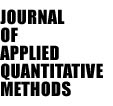 |
|
|||
JAQM Volume 7, Issue 1 - March 30, 2012
Contents
Does Log-rank test give satisfactory results? (p )
Qamruz ZAMAN,
Karl Peter PFEIFFER
Comparison of effects of two treatments by log-rank test is a very common phenomenon in medical research. Researchers prefer to use log-rank test with out carrying about the assumptions of test, which sometimes not only destroy the effects of study but also misguides the readers. The idea of this article is to review some aspects of log-rank test and to provide some rules of thumb.
Bilevel Programming Problem with Fuzzy Parameters: A Fuzzy Goal Programming Approach (p )
Surapati PRAMANIK
This paper describes how fuzzy goal programming can be efficiently used to solve bilevel programming problems with fuzzy parameters. In the model formulation of the problem, the tolerance membership functions for the fuzzily described objective functions of decision makers are defined by determining individual optimal solution of each of the level decision makers. Since the objectives are potentially conflicting in nature, a possible relaxation of the upper level and lower level decision are considered by providing preference bounds on the decision variables for avoiding decision deadlock. Then fuzzy goal programming approach is used for achieving highest degree of each of the membership goals by minimizing negative deviational variables. Three fuzzy goal programming models are presented. Distance function is used to identify which fuzzy goal programming models offers better optimal solution. A numerical example is presented to demonstrate the potential use of the proposed approach.
The Spending Explosion: Positional Externalities and Exponential Consumption Growth (p )
Michael LEWIS
Since the 1960s, The United States has experienced increased income inequality. Economist Robert Frank has argued that this increase in inequality has resulted in an expenditure cascade as people have tried to maintain their relative socioeconomic statuses by imitating the spending patterns of those in their reference groups. Although some researchers have tried to empirically determine the extent to which Frank’s assessment is correct, none have focused on the implications of Frank’s argument for the dynamics of consumption. That is, none have focused on how time series of measures of consumption should look, assuming Frank is right. This paper does exactly that. Drawing on a mathematical model from population biology, it is argued that if Frank is correct, measures of consumption should exhibit exponential growth. It was found that the exponential growth models provided excellent fits to available data on United States consumption measures.
Natural Resource Management in the Context of Sustainable Growth (p )
Gheorghe VLASCEANU
Present realities show that the 21st century is the period of the greatest discoveries and transformations of the human civilization but, at the same time, of the most complex and, quite often, unsuspected effects on life. The demographic explosion and the unprecedented progress of all activity branches were naturally followed by an increase in the demand for raw materials and energy, and this in turn showed the need for thoughtful exploitation of natural resources so that the development of society may be a sustainable one. Moderate exploitation of resources has become essential given the fact that the sustainable development of human society directly depends on the sustainable exploitation of natural resources. A sustainable exploitation of resources leads to the preservation of biodiversity and atmospheric stability as well as to a steady base of resources..

